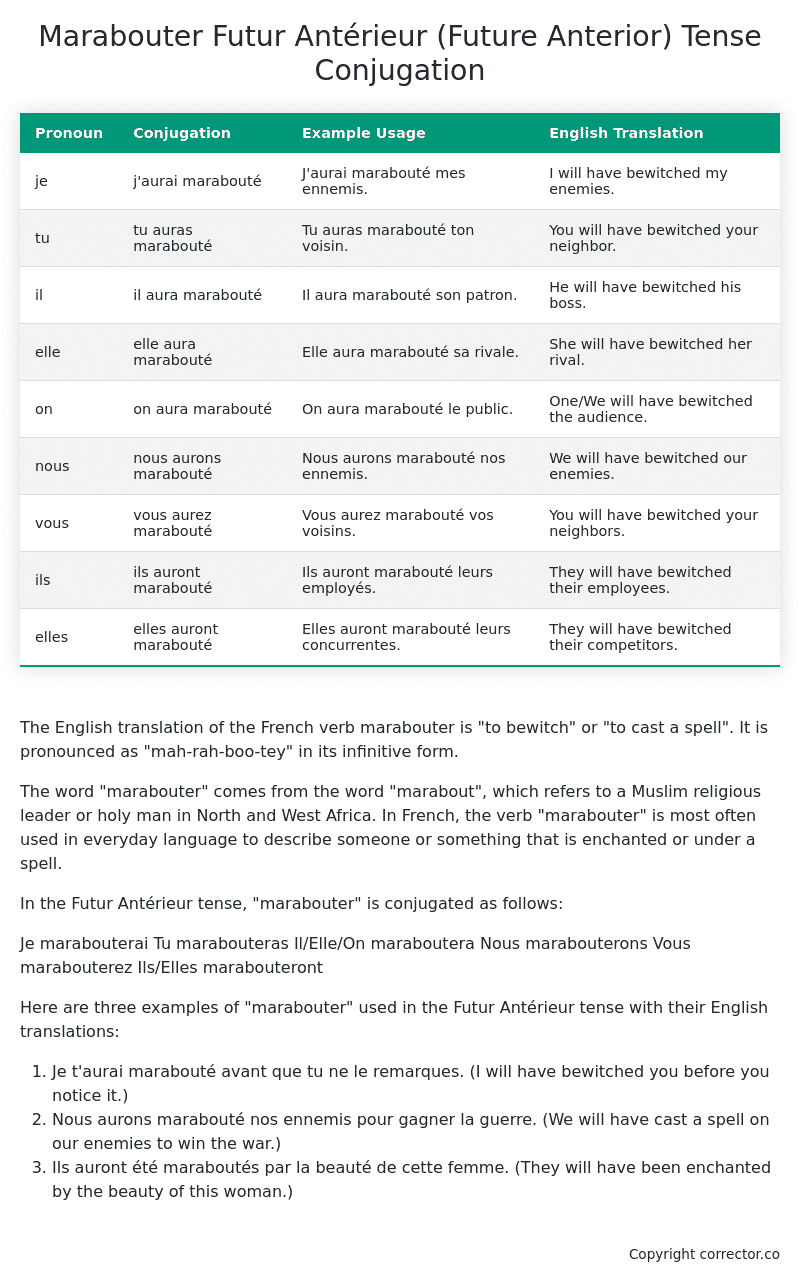Futur Antérieur (Future Anterior) Tense Conjugation of the French Verb marabouter
Introduction to the verb marabouter
The English translation of the French verb marabouter is “to bewitch” or “to cast a spell”. It is pronounced as “mah-rah-boo-tey” in its infinitive form.
The word “marabouter” comes from the word “marabout”, which refers to a Muslim religious leader or holy man in North and West Africa. In French, the verb “marabouter” is most often used in everyday language to describe someone or something that is enchanted or under a spell.
In the Futur Antérieur tense, “marabouter” is conjugated as follows:
Je marabouterai
Tu marabouteras
Il/Elle/On maraboutera
Nous marabouterons
Vous marabouterez
Ils/Elles marabouteront
Here are three examples of “marabouter” used in the Futur Antérieur tense with their English translations:
- Je t’aurai marabouté avant que tu ne le remarques. (I will have bewitched you before you notice it.)
- Nous aurons marabouté nos ennemis pour gagner la guerre. (We will have cast a spell on our enemies to win the war.)
- Ils auront été maraboutés par la beauté de cette femme. (They will have been enchanted by the beauty of this woman.)
Table of the Futur Antérieur (Future Anterior) Tense Conjugation of marabouter
| Pronoun | Conjugation | Example Usage | English Translation |
|---|---|---|---|
| je | j’aurai marabouté | J’aurai marabouté mes ennemis. | I will have bewitched my enemies. |
| tu | tu auras marabouté | Tu auras marabouté ton voisin. | You will have bewitched your neighbor. |
| il | il aura marabouté | Il aura marabouté son patron. | He will have bewitched his boss. |
| elle | elle aura marabouté | Elle aura marabouté sa rivale. | She will have bewitched her rival. |
| on | on aura marabouté | On aura marabouté le public. | One/We will have bewitched the audience. |
| nous | nous aurons marabouté | Nous aurons marabouté nos ennemis. | We will have bewitched our enemies. |
| vous | vous aurez marabouté | Vous aurez marabouté vos voisins. | You will have bewitched your neighbors. |
| ils | ils auront marabouté | Ils auront marabouté leurs employés. | They will have bewitched their employees. |
| elles | elles auront marabouté | Elles auront marabouté leurs concurrentes. | They will have bewitched their competitors. |
Other Conjugations for Marabouter.
Le Present (Present Tense) Conjugation of the French Verb marabouter
Imparfait (Imperfect) Tense Conjugation of the French Verb marabouter
Passé Simple (Simple Past) Tense Conjugation of the French Verb marabouter
Passé Composé (Present Perfect) Tense Conjugation of the French Verb marabouter
Futur Simple (Simple Future) Tense Conjugation of the French Verb marabouter
Futur Proche (Near Future) Tense Conjugation of the French Verb marabouter
Plus-que-parfait (Pluperfect) Tense Conjugation of the French Verb marabouter
Passé Antérieur (Past Anterior) Tense Conjugation of the French Verb marabouter
Futur Antérieur (Future Anterior) Tense Conjugation of the French Verb marabouter (this article)
Subjonctif Présent (Subjunctive Present) Tense Conjugation of the French Verb marabouter
Subjonctif Passé (Subjunctive Past) Tense Conjugation of the French Verb marabouter
Subjonctif Imparfait (Subjunctive Imperfect) Tense Conjugation of the French Verb marabouter
Subjonctif Plus-que-parfait (Subjunctive Pluperfect) Tense Conjugation of the French Verb marabouter
Conditionnel Présent (Conditional Present) Tense Conjugation of the French Verb marabouter
Conditionnel Passé (Conditional Past) Tense Conjugation of the French Verb marabouter
L’impératif Présent (Imperative Present) Tense Conjugation of the French Verb marabouter
L’infinitif Présent (Infinitive Present) Tense Conjugation of the French Verb marabouter
Struggling with French verbs or the language in general? Why not use our free French Grammar Checker – no registration required!
Get a FREE Download Study Sheet of this Conjugation 🔥
Simply right click the image below, click “save image” and get your free reference for the marabouter Futur Antérieur tense conjugation!

Marabouter – About the French Futur Antérieur (Future Anterior) Tense
Construction
Common Everyday Usage Patterns
Interactions with Other Tenses
For example
Summary
I hope you enjoyed this article on the verb marabouter. Still in a learning mood? Check out another TOTALLY random French verb conjugation!


